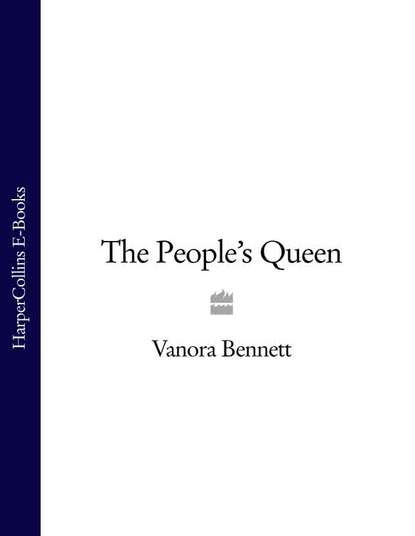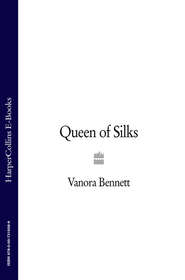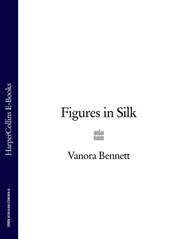По всем вопросам обращайтесь на: info@litportal.ru
(©) 2003-2024.
✖
The People’s Queen
Настройки чтения
Размер шрифта
Высота строк
Поля
Feeling foolish, though relieved she seems to find his bewilderment amusing, Chaucer bows again, not sure if he’s making things better or worse. As he rises, he stammers, ‘Madame Perrers…it’s just…I wouldn’t have expected…of course, I’m honoured.’
He can see now that she’s come purely to see him off – to wish him well, him, Geoffrey Chaucer. And why not? She’s been as warm, for all these weeks, as if he were her oldest friend. Still, surely it’s natural for him to be flustered at her suddenly appearing here now, with the old boatman he’s ordered for far too early spitting and coughing down there and giving him killer looks, with the two men who were supposed to be travelling to London with him still not here, and with him cutting a not very dashing figure hitching up his robes and helplessly waiting and even more helplessly gawping at her as if she were the Grim Reaper, as she says. Too late, he realises that was funny, and his mouth starts to twitch upwards. He still can’t believe she’s found the time, with all the royal household to run, that she’s thought to leave the King’s chamber for him.
She nods as the smile gains ground on his face, as if she’s pleased he’s still got a sense of humour. ‘I had to be up early anyway. I’m supervising the packing today,’ she says by way of casual explanation. ‘And it only takes a minute to run down here.’
Dumbly, he nods, overcome once more.
Before he can mumble, ‘I’m honoured,’ again, she adds, more seriously, as if it were the question closest to her heart, ‘And I had a question for before you go. I wanted to be sure you’ve ordered a good dinner for your guests today.’ She gives him a piercing look, her head on one side, like a plump little bird, and waits.
Chaucer feels his mouth open and close as he stumbles towards the best reply. All his vague but tumultuous hopes for his new life have vanished as soon as he hears that question. He just feels sick. He wonders if she knows how difficult he’s finding it, or if she’s just hit by chance on his worst fear for the day.
The plan is this. After being shown his desk at the Customs House this morning, he’s to play host at dinner in his new home to the Mayor and all the greatest merchants of London.
Geoffrey hopes Philippa understands how elaborate this meal should be, how London citizens are as grand as Florentine merchant princes in their habits and expectations, and how lavish they’ll expect the hospitality of the man who will dare to check their books to be.
But he’s miserably aware that there was something too dismissive about his wife’s shrug when, at their last meeting three days before, as she set off to move their cushions and tapestries and silverware into the new City apartment, he asked for a list of dishes.
‘It’s all in hand,’ Philippa said, refusing to be drawn. When he started to say something more, she just flapped her hands at him. ‘It’s going to be a Friday,’ she added, too calmly. ‘Fish. Yes?’ And she wafted off.
Unhappily, he thinks: I can influence most people. If only I could my wife. He lifts hangdog eyes to Alice Perrers’ face, and sees she understands the whole family drama he isn’t going to tell her.
‘They’ll expect the best,’ is all she says. Then she pats his arm, comfortingly, though the gesture reminds him, uncomfortably, of Thomas’s similar one during that other conversation. ‘But of course you know that, don’t you?’
He nods. He’ll just have to hope for the best. He’s glad to see, behind Alice’s back, that the two shapes he’s been looking for are finally here, and sauntering closer. He’ll feel better once they get started. He doesn’t want to have any more time to worry.
Yet unease follows Chaucer on to the river, and beyond.
He tries to relax on the mouldy cushions of the boat. He watches a swan and her cygnets float by, their beaks marked with the two lines of the Vintners’ Company, and begin an altercation with a family of ducks. He flexes his fingers. He bites his lips.
Kindly, Latimer lets him be. The chamberlain starts a quiet conversation with Stury, on the other bench. But Latimer’s voice, from those earlier briefings, still fills Chaucer’s head.
England’s biggest export is wool. The wool trade has been booming for decades, even if the last couple of years haven’t been so good, what with the war. The merchants who buy wool from farmers around England and sell it overseas at the Flanders cloth markets have become both rich and powerful – the richest among them with incomes greater than those of the mightiest prince, wealth extraordinary enough to take on even the princely traders of Florence and Venice. The King, who understands the ways of his barons and peasants, but doesn’t completely understand this new kind of man – a man governed by coin, not chivalry – needs eyes and ears to help explain the merchants to him; explain how best he should love them, and how best to attract their money to him.
The King needs to know, because the King needs those merchants, now he’s up to his own eyeballs in war debt; oh, how he needs them. Their wool and their taxes pay for his war. And, because, over time, he’s shown himself willing, every now and then, when his need is great, or the opportunity is tempting, to cheat them – just a little, as is his royal right, in the interests of the nation – they don’t fully trust him, any more than he fully trusts them. They might want to cheat him back. It’s to be Chaucer’s job to stop them if they try.
The two hundred English merchants run the wool export trade as a monopoly (from a headquarters that for years before the war was based, for convenience’s sake, at Calais, the English-ruled garrison mid-way between England and Flanders; only now that the war’s started again, and Flemish buyers can’t get across enemy French territory to Calais, the Wool Staple’s had to be moved to the safety of Middleburg, in Flanders itself, so the merchants don’t go broke). The Merchants of the Staple still finance the King’s garrison at Calais, even in these hard times, when they can’t actually trade there. They don’t have much choice. The King asks for their money, with tears in his handsome Plantagenet eyes, with a tremble in his elegant French, ‘for the sake of our beloved England’. Their French isn’t as good as his, but they understand. They pay up. They make an agreement with the King as to how he’s going to repay them, one day, by letting them off some of their future wool customs dues to the Crown. It’s all signed and sealed with many-coloured wax, but no one can really hope to be repaid. But, after that, right here and now, the merchants must provide actual gold and silver, and make coins at the mint they’ve set up at Calais, and give it over to the soldiers waiting and grumbling in the salt swamps of north France.
So it makes the Merchants of the Wool Staple angry with the King if they find out he’s been cheating them – for instance by granting special licences to the Italian merchant community trading out of London, so the foreigners can bypass all the weighing and measuring and customs-paying that English merchants have to endure at Calais or Middleburg. This blithe cheating keeps the Italians happy, as they get to make a bigger profit margin while undercutting the English merchants’ sales prices later, at the Flanders wool fairs. It makes the King happy, too, because how can the Italians then refuse when he asks them for a direct loan, to help pay for his war in France?
But there isn’t much the Merchants of the Wool Staple can do about being ripped off by their King, except grin and bear it and, when the King then asks them for a direct loan, too (since the Italians have been so generous), to agree, and ask to take on the Italians’ loan, too, on condition the Italians have their special licences cancelled, so the English, at least, get their monopoly of wool exports back. And then they’re left shouldering a double debt burden, with no guarantee that the King might not, tomorrow or the next day, take it into his head to do another quiet little deal with another Italian to get off scot free from all taxes for a quick cash payment now. There’s nothing the merchants can do openly to let off steam. Sometimes the English merchants’ apprentices, having heard unpleasant things said about the Italian merchants of London at their masters’ tables, get drunk and go and beat up the nearest Italian. The apprentices are savagely punished. Hanged, often. There’s never any question of calling the King to account.
Chaucer’s job will not be to call the King to account. It will be to be the royal eyes and ears inside London. He will deal with the pre-exports: what leaves England. London is the last place a King’s man can, realistically, get at the wool due for export; after that it’s entirely in the hands of the merchants themselves. For almost the entire wool crop leaving England goes through London, where it is packed and weighed and warehoused by merchants; and it’s here that the greatest merchants live. It will be Chaucer’s job to reweigh the wool crop, sack by sack, and go through the merchants’ paperwork, and to form his own view of how big the English trade in wool really is, and how much the merchants should really have paid the King for these exports, or for others, and, generally, to increase the King’s income from the City merchants in whatever way he sees fit.
‘Be one of them,’ Latimer has told Chaucer. ‘Make them feel at home with you. Listen to their privy talk. You’ll know how. But always remember the reckoning. The bill for these past three years of war has been £200,000, and the truce that’s holding now won’t last for ever. As long as you’re clearing more than 25,000 sacks of wool a year, and getting an annual yield of £70,000 on it, England’s still afloat. More or less,’ and here, Chaucer recalls, the Baron’s face wrinkled into a long, mirthless grin that was more like a snarl. ‘At least, as long as the Pope doesn’t also come back with his begging bowl. Thirty thousand for his Italian wars, indeed. We can’t afford to pay to fight the French and for him to wage wars too. Things are far too tight as it is.’
The vast amounts take Chaucer’s breath away, even more than the tightness of the royal finances, the narrowness of the margins, and the King’s reliance on a mixture of charm and bullying of the entrepreneurs whose language he doesn’t even speak (the King sticks to French) to keep England staggering on. He feels naive to be so astonished by these enormous figures. But he is. Chaucer lives in small coin, on graces and favours. The sheer staggering weight of the money being talked about is beyond his ken.
And when they disembark, his welter of conflicting emotions only swirls more wildly.
He shouldn’t be surprised, he tells himself. It’s years since he’s been surrounded like this by his father’s acquaintances. He was a child. Watching these half-dozen mostly familiar faces now, the jowls and wrinkles more accentuated than he remembers, the stubble going grey or white on firmly jutting chins (though the furs on their long gowns, worn despite the heat of the day, are more splendid than ever), he feels, almost, a little boy again – the little boy his father used to get in to serve the merchants their wine in the Chaucer house on Thames Street. That smaller Chaucer used to listen admiringly to the talk about pepper imports and mackerel catches and the iniquity of the law allowing foreign merchants to retail their goods on English soil and the quality of this year’s wine from Gascony, while outside on the wharves that you could see, dimly, through the glass windows (how proud his father had been of those glass windows), the men running like ants under the winches, watching the barrels swinging down, and the flash and splash of river traffic. Back then, Chaucer knew that any minute he’d feel his father’s hand ruffling his head or patting his back. Those quiet, fond, proud touches, which in the manner of small boys trying to be big he never acknowledged, but which he always quietly put himself in the way of, are all that’s missing now.
He presses his lips and eyelids together. No point in regrets. John Chaucer, who so wanted to better himself that he spent the Mortality years trailing around France in King Edward’s baggage train buying wine for the forces, and then for the King himself, would have been proud to see his son here today, stepping up to the Wool Wharf, the powerhouse where English wealth is made, measured and exported, in the very shadow of the Tower of London, being deferred to by the powerful men he worked so hard to make his own friends.
Chaucer looks around. This year’s Mayor is in the welcoming party (a stringy grey man from a lesser guild; Chaucer has no childhood memories of him). More importantly, the man who’s about to become Mayor for the next year is here too: William Walworth, fishmonger and alderman of Bridge Ward, a tall, ascetic-looking man with spun-gold hair and the innocent face of an angel. Chaucer remembers Walworth’s long, thin legs, crossing and uncrossing themselves, the elegant, tendony ankles, the high-arched feet, from a very distant past in which the little Geoffrey played quietly under the table with his ball or top, listening to the men’s voices. But it’s another of these familiar men – Nicholas Brembre, tall burly Brembre, now alderman for Bread Street Ward – who steps superbly forward from the furry, velvety, bass-voiced cluster and takes it upon himself to reintroduce the rest. Walworth just stands behind Brembre, looking avuncular. Perhaps, now Walworth has secured the mayor’s office for himself for a year, he’s letting his friend show his paces in time for next year’s selection – for, Chaucer knows, Walworth, Brembre, and the stocky, balding man at his side, John Philpot, a grocer like Brembre, are famous for sticking together and protecting each other’s interests. Between them, the three victuallers pretty much run the City. They share the mayor’s and sheriffs’ jobs among themselves, year in, year out. And these are the three London men to whom the King comes, year in, year out, asking for money. Chaucer can see for himself how closely they cooperate. Even now, they’re standing together, shoulder to shoulder, making sure he sees their faces first; keeping the lesser men back.
Chaucer remembers Brembre best, from childhood. All that dark energy, those forceful gestures, years ago, once rather frightened little Geoffrey. But now Chaucer has adult eyes in his head, and what he sees with them is that Brembre has become golden. Almost physically golden. The grocer’s skin is gilded, as if by the sun, or (perhaps more plausibly for a man who spends his daylight hours in warehouses, checking his inventories of pepper and saffron and pomegranates) just by good fortune and soft living and ambition satisfied. He’s smooth and honeyed with success. His blue eyes sparkle as brightly as ever, his face is as animated as Chaucer remembers it being long ago, though his large, regular features seem bigger and smoother, his black hair is silver-streaked, and success has slowed the man’s once rapid, excitable speech into a deeper, calmer purr. ‘My dear Geoffrey,’ he says, very warmly, putting an arm around Chaucer’s back, as if claiming ownership. ‘We are all delighted to welcome you back to London.’
Chaucer feels the muscle on that arm even through the gown; it’s as if Brembre, despite his peaceful calling, is made of iron. Brembre has straight, thick, dark eyebrows too; smooth jet-black, like his smooth hair once was. He raises one of these determined eyebrows, and smiles directly into Chaucer’s eyes. Chaucer feels exhilarated by that frank, compelling gaze. ‘And I’, he says, finding his voice, borrowing the warmth of his tone from that of the merchant, ‘am delighted to be once again among the kind of men I can do business with.’
They murmur appreciatively.
Here’s where the future will happen, Chaucer sees, as, bowing his big square head in exaggerated respect, Brembre propels him, with a large, warm, clean hand, to where he will sit, inside the Customs House, now he is comptroller.
Across the room, behind the wall of velvet-clad shoulders, stands an enormous desk. Over there, the merchants of London, every day, write down on the Roll exactly how much wool has been weighed and dispatched, and what taxes have been charged on it. Over here, but separately, at a second enormous desk, Chaucer the comptroller will keep his own independent record in the Counter-Roll. Once a year they’ll compare Roll and Counter-Roll. With all the tact at his disposal, Chaucer will have to tackle these powerful financiers over any discrepancies, and make the sums add up to the King’s satisfaction.
Chaucer takes a deep breath to calm his fast-beating heart. Bowing again to the gathering, he says, skittishly, ‘So, masters, let me try my seat for size,’ and acknowledges their rumbles of laughter with a bow as he gathers his robes in his hands and sits down behind his desk.
He’s glad to be seated while they’re standing – all those big, well-covered men with enormous hands and strong bodies that don’t notice the heat, despite their long furry gowns. They remind him of a flock of waterfowl – geese, or swans, or herons – all so large, yet so implausibly smooth in every movement. They’re tougher than their peaceable gowns make them seem. For all their puffed-up chests and dignity, he can imagine any or all of them mercilessly pecking out the eyes of any impertinent lesser bird, any duck or moorhen or coot that gets in the way of their majestic glide through the waters they rule. And how they’re devouring him with their watchful eyes, all of them, he thinks, suddenly. They’re no fools. They’re wondering if he’ll be trouble. Sizing him up.
Behind him, he’s aware of Latimer and Stury, his court friends, giving Walworth and his merchant friends the same beady looks the merchants are giving him. They’re wondering whether Chaucer will be tough enough to stand up to the merchants. They’re sizing them up.
Chaucer knows, secretly, that his court friends are right to worry about his loyalty. A part of him feels he’s come home as he looks at these smooth merchant faces. When, a moment ago, Brembre has flamboyantly presented his stout friend as ‘my worshipful colleague, John Philpot, a grocer like myself…alderman for Cornhill Ward…you may recall?’ Chaucer knows he’s only just managed to find it in him to refrain from laughing in pure delight. For of course he knows Philpot, and definitely knows of him – he knows that Philpot and Brembre are financing a fleet for the south coast, and have also just reshaped the City’s trade association for victuallers, giving it the new name of grocers and spending fortunes on setting it up grandly.
But that’s not why he’s having to struggle to keep the merry grin off his face. The grin’s because of the memory that pops unbidden into Chaucer’s head of Philpot’s smooth hand reaching out towards him, passing over a gingerbread man with a silvery crown on its head, and of that soft voice, quivering with amusement, saying, ‘Don’t make yourself sick now, my boy.’
Chaucer can’t choke off that memory altogether. He isn’t able not to pronounce the words ‘Dear Uncle John’ with a rush of real affection, or to refrain from saying, out loud, ‘Why, of course. We’re old friends.’ And even he’s surprised to find himself embracing both princes of grocers with such affection that, for a dangerous moment, he feels the mercantile deputation melt and relax, while the courtiers behind him bristle. He’ll have to get a grip: to reapply his courtly manners and his air of polite watchfulness, before any of them take him for a pushover. Forget the gingerbread. He has a job to do.
It’s only as the group walks across the City to the dinner at Chaucer’s new apartment that one of the lesser merchants breaks through the shoulders of Brembre and his friends.
‘I hope you will not be offended,’ the unfamiliar man says to the comptroller, with the heavy accent of Flanders, ‘but I have sent a small gift ahead to your new home, to welcome you to your post. A tun of Gascon wine.’
The man then bows, with a big man’s slouching-shouldered imitation of modesty, includes Chaucer in a huge rolling laugh, and introduces himself as Richard Lyons. He’s almost unnaturally large and luridly coloured, though without an ounce of fat on him. He makes Brembre look small and weak. He has thighs like tree trunks, a pink face, sly, amused eyes, pale orange hair peeping out from under his hat, and a warm, rich voice that projects without effort over everyone else’s. No grey in his stubble – he can’t be older than forty – and plenty of gold at wrist and chest.
Chaucer never met Lyons while a boy in London, but of course he’s heard his name since. Lyons has only emerged as a wealthy man very recently (and, Chaucer remembers, his father, in his latter years, wasn’t always too sure that this new wealth was very honestly acquired, though naturally that’s the kind of thing almost any Londoner will automatically say about almost any foreigner). Chaucer knows the Fleming is now very rich indeed. Even though he’s a foreigner, Lyons is about to serve as one of the next mayor’s two sheriffs – high office – which seems to suggest that the London elite walking down this street favour him, except that it’s very easy to see that, actually, they don’t want him there at all; they feel awkward around him, and are doing everything they can to keep him to the back and dilute his overwhelming presence among them.
Chaucer understands why they’d be nervous. Lyons has been biding his time. He’s stayed in the background, and kept his peace for the past hour. But he’s been the first, all the same, to get in with his charming little bribe.
‘I thank you,’ he says, bowing very politely, ending the conversation. Secretly, he’s breathing a big sigh of relief that, for the moment at least, Lyons, who’s a vintner like Chaucer’s own father, is only here for curiosity’s sake; he’s hoping that this pink-and-orange-and-red-and-gold force of nature doesn’t, in the near future, start getting tied up in the wool trade. At least until Chaucer’s got everything worked out. He can see, right off, that Lyons is a man on the rise, and a man who does things his own way, and a man who’ll always be a focus for trouble.
By the time Lyons bows and moves away, the whole procession, dignitaries, aristocrats, and the new Comptroller of Customs and Subsidy on Wool, Sheepskins and Leather in the Port of London, has passed north and east across half the City – a brisk ten-minute walk, right through the parish of All Hallows Barking, up Water Lane, over Thames Street and Tower Street, and on up Mark Lane into neighbouring Aldgate parish – and is on Aldgate Street itself, heading for the City wall and the gate. All around them, there’s the deafening crash of midday bells for sext.
The City is a democratic place. It’s too small for anything but walking, for even the greatest of men, and Geoffrey Chaucer likes the quiet freedom of strolling through the crowds. It’s one of the pleasures of London, that you can go everywhere on foot. He clings to this notion of enjoying walking, because he’s suddenly a little wobbly inside about how much he really likes London. Travelling has blunted so much of his old pleasure in his home city. Once you’ve seen honeystone Florence, you’re spoiled for ever. Afterwards, how can you feel anything more than slightly pitying affection for this twisty, stinky, thatched, wattle-and-daubed, cobbled, overcrowded, provincial old place? Of course, that isn’t a feeling to share with the men now whispering confidingly into his ear, one by one, that they’ve had a box of pepper, or spices, or fish, or cushions, delivered to his new home as a housewarming gift. True Londoners will always be proud of their White City. They call it the Ringing City, sometimes – all the church bells. It’s a place to walk endlessly through the ringing of bells. That’s one of the things I’ll be doing, from now on, Chaucer thinks, not quite happily.
The apartment above Aldgate was signed over to him last month, as part of his payment for this job. It’s a great spacious place, looking out over the cut-throat eastern slum villages beyond the City walls one way, along the Colchester road through to Essex on the horizon, and over the roofs and gardens of Holy Trinity Priory and teeming Aldgate Street the other way, inside the City walls.
The apartment itself is all large echoing rooms, with a solar above and a cellar below the easternmost of the six City gates. It’s the only toll-free gate, open to all, beggars included, and there are plenty of those coming from the wild, sparsely populated Essex country beyond. There’ll be people coming and going in their carts underneath Chaucer’s feet every day, cursing as they try to squeeze through the narrow arch, and the clank of the City gate closing every night at curfew. The apartment has been used as a prison in the past; this is a strategic spot. He’s had to swear to use it well and not let enemies of the City enter through the gate below; they’ve had to swear not to put prisoners in there with him and his family for his lifetime. It was a comical little City ceremony, the kind that would have made Philippa smirk. But the apartment’s prestigious enough – as good as Stury’s riverside house – so any smirking on her part, right now, is also partly a genuinely happy smile.
Alice Perrers winked when she told him she’d got him the apartment rent-free. ‘It’s not usually rent-free. But the Mayor said yes, for you.’









